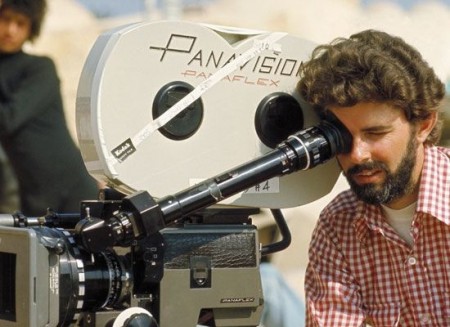WEEKEND OPEN BAR: Lucas Dies in `81
[WEEKEND OPEN BAR: The one-stop ramble-about-anything weekend post at OL. Comment on the topic at hand. Tell us how drunk you are. Describe a comic you bought. This is your chance to bring the party.]
It’s become the stuff of legend – as Star Wars neared the end of production, the pressure began to take its toll on George Lucas. The director found himself working round the clock and constantly worrying about the budget, doing everything in his power to finish the film he’d been imagining for years. Under this incredible strain, Lucas even believed that he suffered a heart attack.
The doctor assured George that he hadn’t had a proper attack, but was suffering from supreme exhaustion and hypertension. And so the film was finished.
The rest, as they say, is history.
But in this tale, it turns out that the ailments weren’t confined to fatigue and irregular blood pressure. George Lucas, despite being told otherwise, had in fact survived a heart attack. The motivation for the misdiagnosis? With so much on the line, both in terms of money and reputation, Twentieth Century Fox had greased the palm of Lucas’ physician, thereby ensuring that their product would be delivered.
Star Wars, of course, was a goddamn commercial and critical juggernaut. Lucas immediately began work on the sequel, and in 1980 The Empire Strikes Back was met with even more admiration. Personally and professionally, the USC alum was on top of the world.
But when it came time to finish the trilogy, George’s heart just couldn’t take it.
The bickering with Marcia climbed to new, more incendiary summits. George knew his wife was talented – hell, the whole world knew – but he couldn’t shake the feeling that his gut instincts were always the ones worth following. Love and work and sex made for a dangerous cocktail, and his home life was far from happy. In fact, it was pretty fucking terrible.
He and Stevie had barely finished their pet project when it was time to return to his space-epic. George was at a loss – he had some real, inspired ideas as to how the trilogy should conclude – like the serials of his childhood and the Spaghetti Westerns of his adolescence, this new movie should end on a somber, open-ended note. Perhaps the battle is won, but a new war looms on the horizon.
But he also knew what the studio executives were expecting. Cutesy. Cuddly. Lunchboxes and action figures. He was willing to bend, allowing for merchandise to made and marketed. But he couldn’t shake the feeling that they were trying to break him. They had come dangerously close to ruining him back in `78.
So on an October evening in 1981, when George Lucas felt those same chest pains he had experienced on the set of Star Wars, he put aside his notes and tried to relax, take his mind off the troubles at hand. He sat back in his recliner, rubbed his temples, closed his eyes, and tried to escape his woes.
George Lucas died at the age of 37.
Determined to realize his friend’s vision, Steven Spielberg spearheaded the production of the third installment. The director hired David Peoples to drum up the script, as Harrison Ford was constantly singing praises of the screenwriter’s work. Spielberg and Peoples worked closely on the story, following only the notes George had left behind despite pressure from Fox to let them in on the creative process. Unrelenting, the man who had brought terror to the Atlantic and close encounters to small-town America delivered a fitting ending for the bildungsroman of Luke Skywalker.
Revenge of the Jedi was released May 25, 1983 to stellar reviews. Critics admired Spielberg’s decision to provide an uplifting conclusion to the films’ intergalactic civil war while still peppering in shockingly dark moments. Gene Siskel wrote, “The (highly publicized) death of Han Solo in the first act sets the tone for the rest of the film; victory is attainable, but often comes at the cost of great personal detriment. And yet the pervading optimism makes the subsequent losses that much more affective.”
Family-values groups protested the movie, believing the scene on Dagobah to be psychologically damaging to the childhood psyche. While these groups were certainly overreacting, Luke’s discovery that Yoda is already dead is unnerving. After all, we’re led to believe that our hero will find out both the truth of his parentage and if there is another hope for the galaxy. And neither is delivered. From a creative point of view, it’s a brilliant maneuver, forcing the viewer to wrestle with “I am your father” until the very end.
The film also received the ephemeral scorn of animal activists who responded to unfounded urban legends regarding the thrilling Wookie battle. Thanks to the incredible work of Rick Baker, rumors circulated that the scene in which Chewbacca’s family is slaughtered was created by filming stray dogs being force fed grenades. But not even this absurd lie, or the knee-jerk reaction to it, could dissuade moviegoers and the film became the highest-grossing of all time.
With Revenge of the Jedi‘s open-ended finale – Luke Skywalker walking off into the sunset as Leia calls out to him, the unknown fate of Lando and Chewie after their assault on Death Star 2 – fans have been clamoring for a new Star Wars for years. But it’s 2011 and Spielberg has yet to cave:
“It just wouldn’t be right. Star Wars was George’s baby and I know he’d hate to see it done for the wrong reasons. What would you want to see, Darth Vader as a little kid or something? It’d be ridiculous.
After a trilogy of solid movies, why continue? Those movies will always be there…and I think there’s something to be said for using our minds to fill in the rest ourselves.”
+++
George Lucas dies in 1981.
Then what?




